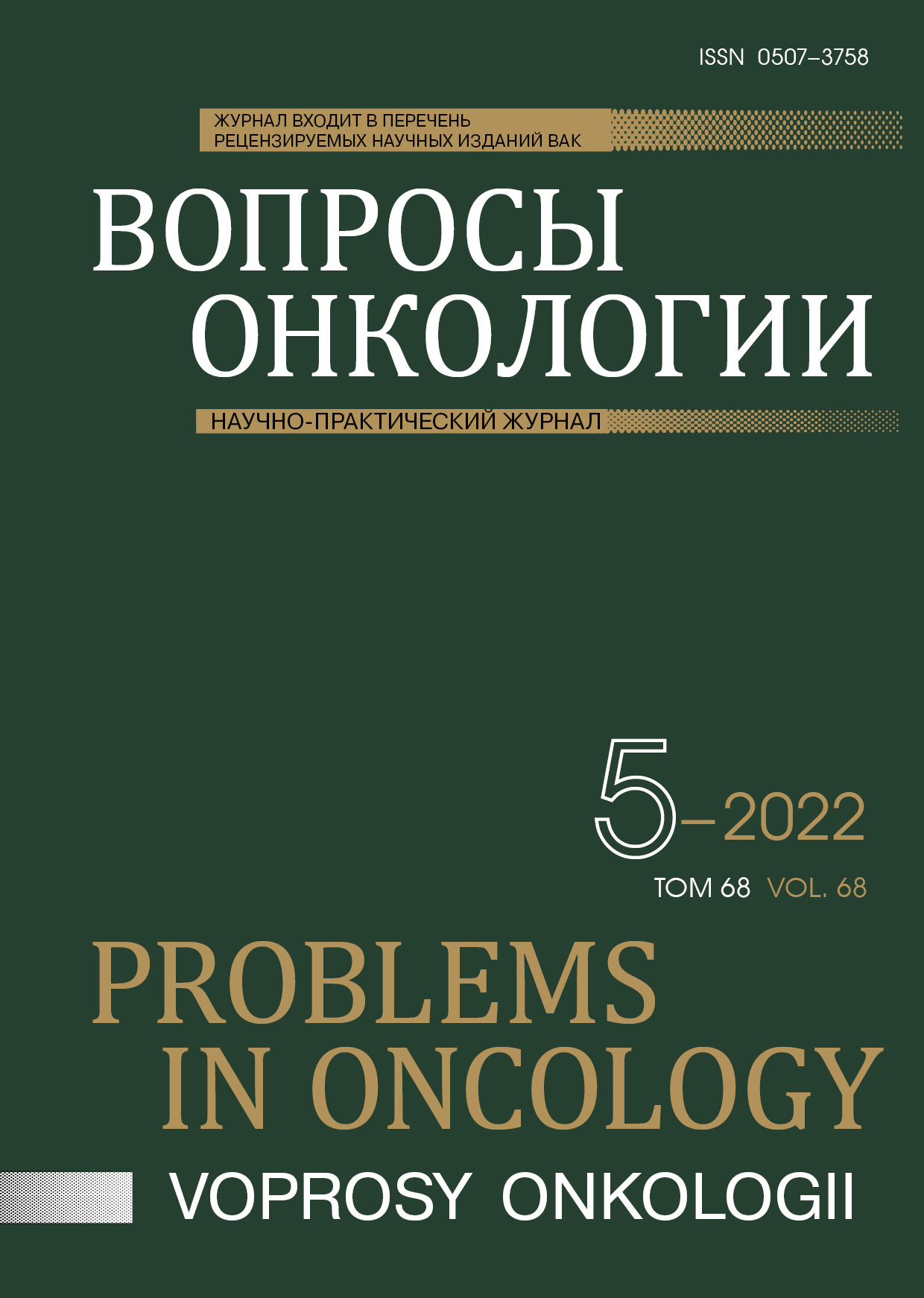Abstract
The discovery of recurrent EGFR mutations, ALK and ROS1 translocations, together with the development of effective targeted drugs, has become a real breakthrough in the treatment of lung cancer. Molecular diagnosis of alteration in these genes has already become a mandatory part of evaluating patients with non-small cell lung cancer.
The paper presents a combined diagnostic approach, which allows the identification of known chimeric transcripts and new variants of translocations. Using this technique, we identified eight fusions that had not been previously described in the literature.
Here, we analyze the spectrum of translocations of receptor tyrosine kinases ALK, ROS1, RET in the Russian population, which seems relevant in connection with the known ethnic and geographic heterogeneity of lung cancer.
References
Bray F, Ferlay J, Soerjomataram I et al. Global cancer statistics 2018: GLOBOCAN estimates of incidence and mortality worldwide for 36 cancers in 185 countries // CA Cancer J Clin. 2018;68(6):394–424. doi:10.3322/caac.21492
Мерабишвили В.М., Арсеньев А.И., Тарков С.А. и др. Заболеваемость и смертность населения от рака легкого, достоверность учета // Сибирский онкологический журнал. 2018;17 (6):15–26. doi:10.21294/1814-4861-2018-17-6-15-26 [Merabishvili VM, Arseniev AI, Tarkov SA et al. Lung cancer morbidity and mortality // Siberian Journal of Oncology. 2018;17(6):15–26 (In Russ.)]. doi:10.21294/1814-4861-2018-17-6-15-26
Carter BW, Glisson BS, Truong MT et al. Small cell lung carcinoma: staging, imaging, and treatment considerations // Radiographics. 2014;34(6):1707–1721. doi:10.1148/rg.346140178
Horn L, Mansfield AS, Szczęsna A et al. First-Line Atezolizumab plus Chemotherapy in Extensive-Stage Small-Cell Lung Cancer // N Engl J Med. 2018;379(23):2220–2229. doi:10.1056/NEJMoa1809064
Yoda S, Dagogo-Jack I, Hata AN. Targeting oncogenic drivers in lung cancer: Recent progress, current challenges and future opportunities // Pharmacol Ther. 2019;193:20–30. doi:10.1016/j.pharmthera.2018.08.007
Takeuchi K, Soda M, Togashi Y et al. RET, ROS1 and ALK fusions in lung cancer // Nat Med. 2012;18(3):378–381. doi:10.1038/nm.2658
Kohno T, Nakaoku T, Tsuta K et al. Beyond ALK-RET, ROS1 and other oncogene fusions in lung cancer // Transl Lung Cancer Res. 2015;4(2):156–64. doi:10.3978/j.issn.2218-6751.2014.11.11
Woo CG, Seo S, Kim SW et al. Differential protein stability and clinical responses of EML4-ALK fusion variants to various ALK inhibitors in advanced ALK-rearranged non-small cell lung cancer // Ann Oncol. 2017;28(4):791–797. doi:10.1093/annonc/mdw693
Pao W, Miller V, Zakowski M et al. EGF receptor gene mutations are common in lung cancers from «never smokers» and are associated with sensitivity of tumors to gefitinib and erlotinib // Proc Natl Acad Sci USA. 2004;101(36):13306–11. doi:10.1073/pnas.0405220101
Chomczynski P, Sacchi N. The single-step method of RNA isolation by acid guanidinium thiocyanate-phenol-chloroform extraction: twenty-something years on // Nat Protoc. 2006;1(2):581–585. doi:10.1038/nprot.2006.83
Iyevleva AG, Raskin GA, Tiurin VI et al. Novel ALK fusion partners in lung cancer // Cancer Lett. 2015;362(1):116–121. doi:10.1016/j.canlet.2015.03.028
Devarakonda S, Morgensztern D, Govindan R. Genomic alterations in lung adenocarcinoma // Lancet Oncol. 2015;16:E342–51. doi:10.1016/S1470-2045(15)00077-7
Demidova I, Grinevich V, Avdalian A et al. Detection of ALK rearrangements in 4002 Russian patients: The utility of different diagnostic approaches // Lung Cancer. 2017;103:17–23. doi:10.1016/j.lungcan.2016.11.001

This work is licensed under a Creative Commons Attribution-NonCommercial-NoDerivatives 4.0 International License.
© АННМО «Вопросы онкологии», Copyright (c) 2022
